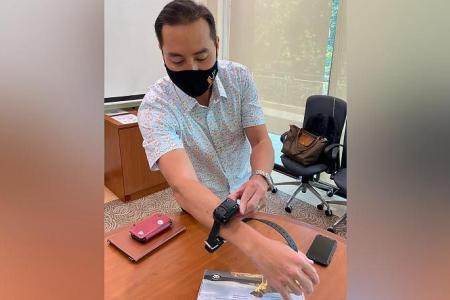Tan Kiat How tests electronic dog collar, fails at Level 7
Just how painful is that electronic collar when it delivers a shock to a dog?
Senior Minister of State for National Development Tan Kiat How can tell you first hand.
He tried a variety of electronic collars for dogs, or e-collars, on himself to find out, and his verdict: Level 7 was too much to take.
Mr Tan told The Straits Times: “It was important for me to try the e-collars on myself to better understand what the dogs go through, and better appreciate the perspectives of the various stakeholder groups.”
Officers at the National Parks Board (NParks) were reviewing if such shock collars should be used in training dogs, and arranged for him to try a variety of them on his arm.
“The electronic collars caused sharp pain when set on higher intensity. I did not manage to get to the maximum setting. Besides the pain, it was the unanticipated shock that was most disconcerting for me,” Mr Tan said.
The question of using the e-collars on dogs was raised in Parliament on March 7 by Mr Louis Ng (Nee Soon GRC), who asked the Ministry of National Development (MND) for an update on a study it had conducted on the use of such collars in animal training.
An electronic collar, when triggered, transmits an electrical stimulus of varying intensities to the dog’s nerves, causing pain to the animal.
They are often used as a training device or to prevent dogs from running out of yards, and can be set to varying intensities.
There is a perennial debate here and overseas on the use of such collars to train dogs.
Electronic shock collars for dogs are currently banned in places such as Germany, Austria, Denmark, Norway, Sweden, Portugal, Slovenia, Switzerland, Wales, Quebec in Canada, and some states in Australia.
England most recently banned the use of such dog collars, from Feb 1, 2024, following a 10-year campaign by animal welfare groups.
As early as 1999, the Society for the Prevention of Cruelty to Animals here had supported a proposal by the Singapore Kennel Club to ban these collars in the Republic.
The Government commissioned a study on electronic collars in 2020.
Mr Tan, who is also Senior Minister of State for Communications and Information, told ST that the study concluded that these tools should be used only as a last resort, when all other science-based training methods have been exhausted.
“Electric collars are considered aversive training tools that utilise positive punishment or negative reinforcement, by delivering electric shocks through contact points on the animal. Although there may be exceptional circumstances which may warrant the use of such aversive training tools, (they) cause pain and distress to the animal,” Mr Tan said.
“More importantly, the use of such tools, including the use of electric collars, must be done properly and by trained personnel so that the desired outcomes are achieved. NParks will not hesitate to take enforcement actions if electric collars are used inappropriately.”
He added that NParks is in the midst of developing guidelines on the use of these collars in dog training, in consultation with some groups.
He said the new guidelines will be released “in the coming months” to recommend good practices. They are not legally enforceable.
In his follow-up question in Parliament, Mr Ng asked what concerns MND had about banning the use of electric collars in Singapore.
“I think Mr Tan himself tried the use of the electric collar and it is painful. Obviously it’s painful for the dogs as well and that’s why it is being used to train them. So how could it not be a physical abuse when it causes pain and suffering to the dogs which are being trained?” he asked.
Tongue in cheek, Mr Tan said that he did not know Mr Ng “was keeping track of me”.
He said later that he had tested the collars in a closed-door session with NParks colleagues.
“I certainly did not expect Mr Ng to know about it and raise it in Parliament. But I thought it was important for me to try the electric collars on myself, to better understand what the dogs go through, and better appreciate the perspectives of the various stakeholder groups,” he added.
Get The New Paper on your phone with the free TNP app. Download from the Apple App Store or Google Play Store now


